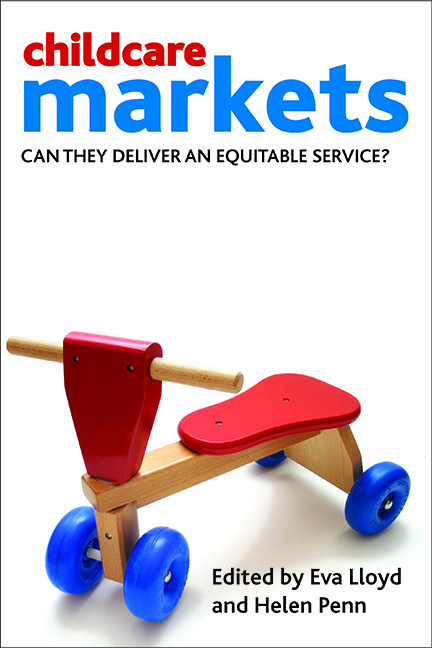thirteen - Childcare markets and government intervention
Published online by Cambridge University Press: 01 September 2022
Summary
Introduction
Childcare is different from other goods and services traded in markets. Its unique set of characteristics raises issues and choices which have been addressed with great diversity across the world. Indeed, the range of issues that has been explored in this book reflects both the multitude of concerns and social objectives as well as the breadth of academic disciplines that have contributed to the discussions presented here.
To summarise this diversity into a single comparative framework is simply not feasible. Instead, this chapter draws together the economic elements to assess the role of the market in childcare provision and the case for government intervention. It begins by describing the advantages of a private market and then summarises the evidence presented above on the problems in the operation of this market, the social objectives that have driven government intervention and the policy solutions that have been used around the world.
The advantages of a market
One of the more unusual features of childcare is that it can have a dual purpose for parents: to allow parents (primarily mothers) to undertake formal employment and to provide developmental or educational benefits to the child which are not available from parental care. Although it is often argued that parents value both benefits, it is the facilitation of maternal care which appears the dominating factor (for example, as suggested by Blackburn in his discussion of the UK and as reported by Penn in the case of Namibia and Sosinsky in the case of the US).
As highlighted in several of the chapters (for example, Plantenga, Mitchell), the provision of childcare through a market mechanism, like other goods and services, has a number of advantages. First, a flexible price which reflects both consumers’ preferences and suppliers’ costs of production results in a selection of goods being produced which best meets consumers’ preferences given the constraint of available resources. In a childcare market, this means that the bundle of childcare type and quality that is provided and used by parents is the best possible mixture given the amount that parents can spend on childcare. Second, competition between providers ensures that the good is produced at minimum cost and that the price paid by the consumer is set equal to this minimum cost.
- Type
- Chapter
- Information
- Childcare MarketsCan They Deliver an Equitable Service?, pp. 227 - 246Publisher: Bristol University PressPrint publication year: 2012



